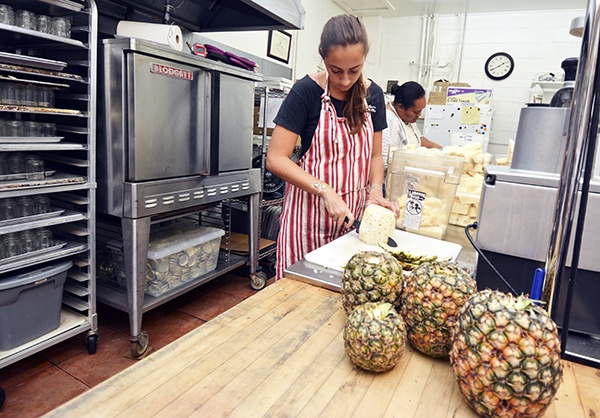LIHUE — A vision to boost the island’s agriculture and food industries by creating a centralized processing facility may not be such a good idea after all, according to a county study conducted through the Office of Economic Development. A majority of
LIHUE — A vision to boost the island’s agriculture and food industries by creating a centralized processing facility may not be such a good idea after all, according to a county study conducted through the Office of Economic Development.
A majority of the 23 Kauai farmers — consisting of both conventional and organic food growers — who responded to a survey within the county-funded study said they were content with the way business is done now and were not interested in collaborating with other growers to promote their products.
“What appeared to be on the surface a really good idea — and I thought it was a good idea — apparently, after interviewing a number of farmers, including myself, by the way — did not end up being the consensus among farmers,” Kauai Farm Bureau President Jerry Ornellas said.
Seventy percent said they were not interested in “adding value or combining like products with other partners to address a larger market opportunity.” Only a small portion of the farmers who responded said they would use the proposed food hub facility on a part-time basis.
One component of the $50,000 study conducted by Auburn, Calif.-based consulting firm Claggett Wolfe Associates that did show some promise, however, was the county’s proposal to support a kitchen incubator facility for fledgling food companies.
It is a need that Deep Harbor, Inc. President Greg Askew knows well.
After partnering with brothers Joe Welch and Josh Lanthier-Welch on Oahu to bring their local twist on paletas, Mexican ice pops made from fresh fruit, over to Kauai and negotiating the distribution and manufacturing agreements to get the ball rolling, Askew said he faced a critical problem: finding a place on-island to make those popsicles, called OnoPops.
“We’re going to have to move into a commercial space that we’re going to have to pay commercial rent for and that’s what will make it more financially challenging in the early years,” Askew said.
The concept to create a food hub, according to county documents, arose out of two studies that sought to determine whether it would be feasible for the county to boost the island’s food and agriculture industries by subsidizing a community kitchen and mobile or modular slaughter, chill and processing facility.
This food hub would have also incorporated “the processing of produce to comply with food safety regulations and a retail outlet for Kauai Grown produce and Kauai Made products within the same facility.”
“Our rationale was that it makes sense to combine activities because you have a lower overhead instead of having it rely on one entity to carry all of the fixed costs — you can share it among four different components in a food hub,” Ornellas said.
Ornellas said the food hub concept would allow growers to more easily adapt to a new federal law, signed by President Barack Obama three years ago, directing those who grow, process, transport and store food to adopt modern food safety prevention practices.
“It’s going to be hard for the smaller farmers to set up certified packing houses that are going to meet the requirements of the new law, so that was one of the rationales for the food hub as well,” Ornellas said. “Rather than have 20 different packing houses, we could consolidate it into one.”
A recurring recommendation put forth by surveyed farmers, Claggett Wolfe Associates President Chuck Wolfe told Kauai County Council members at a recent meeting, where the study’s findings were released, was creating more workforce housing opportunities for agricultural workers.
Councilwoman JoAnn Yukimura said other ideas, such as creating stable land lease arrangements for farmers by promoting more agricultural parks on the island, must also be considered as long-term solutions.
Separately funded studies conducted by Claggett Wolfe Associates also determined that several individual functions within the county’s proposed food hub — those for a Kauai Made and Kauai Grown retail store and meat processing facility — were not viable.
All told, about $110,000 in taxpayer money was spent on three individual studies conducted by the Auburn, Calif.-based consulting company.


